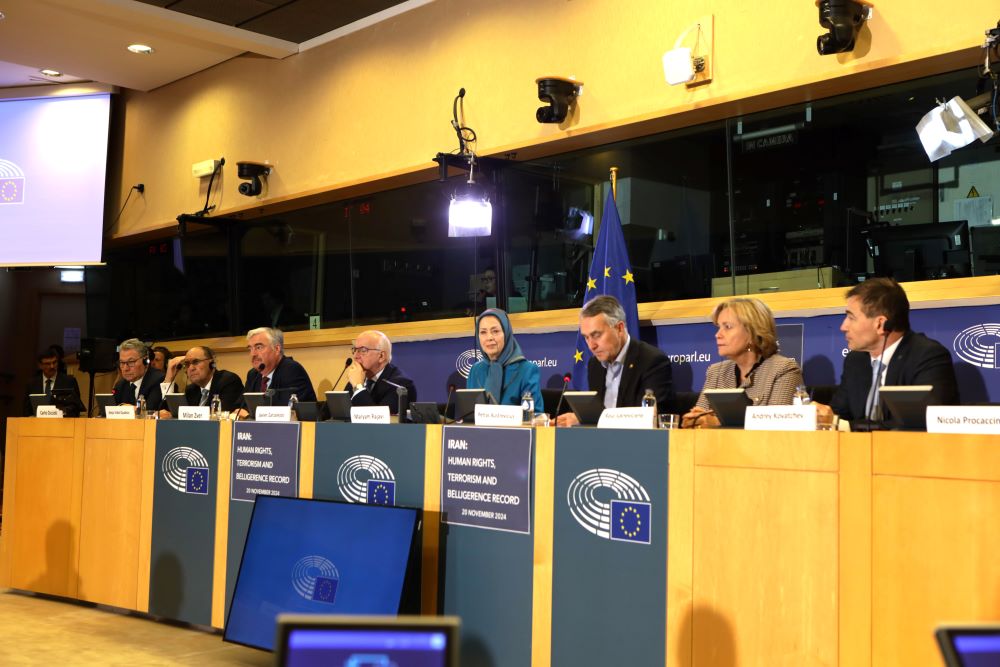
On November 20, 2024, a pivotal conference took place at the European Parliament, organized by Friends of a Free Iran, focusing on the urgent need for regime change in Iran. The event featured Mrs. Maryam Rajavi, the President-elect of the National Council of Resistance of Iran (NCRI), who articulated a comprehensive vision for a democratic future in Iran. This gathering not only highlighted the ongoing struggles faced by the Iranian people under a repressive regime but also emphasized the role of organized resistance in achieving meaningful change.
Conference at the European Parliament
I would like to extend my congratulations to the new leadership of the European Union. I hope that by rejecting all forms of appeasement, the EU would undertake a decisive policy towards the mullahs’ terrorist and belligerent regime. Such… pic.twitter.com/vYP2hHTrnE— Maryam Rajavi (@Maryam_Rajavi) November 20, 2024
The Call for Change
Rajavi’s speech underscored the dire situation in Iran, where human rights violations have reached alarming levels, with over 800 executions reported in 2024 alone. She pointed out that the Iranian regime, led by Supreme Leader Ali Khamenei, has consistently relied on external conflicts to maintain its grip on power, fearing that without such distractions, domestic unrest could threaten its survival. Rajavi called for international action against the regime’s malign activities and reiterated the need for the European Union to take a firmer stance against its aggression.
Organized Resistance: A Viable Alternative
At the heart of Mrs. Rajavi‘s message was the assertion that the Iranian people are not powerless; rather, they are supported by a robust and organized resistance movement. She highlighted several key components:
Resistance Units: Thesegrassroots groups, primarily led by women, have been instrumental in mobilizing public dissent against the regime. Their activities have increased significantly, as evidenced by 20,000 documented actions across Iran.
People’s Mojahedin Organization of Iran (PMOI/MEK): With a rich history of opposition to both monarchical and clerical rule, this organization has become a focal point for resistance efforts. The PMOI has suffered greatly under regime repression but continues to rally support both domestically and internationally.
National Council of Resistance of Iran (NCRI): Established over four decades ago, this coalition represents a diverse political spectrum and advocates for fundamental rights such as freedom of expression and gender equality. Notably, women make up more than half of its membership.
Mrs. Rajavi emphasized that the NCRI is not seeking power for itself but aims to restore sovereignty to the Iranian people through a structured democratic transition process. This includes establishing a provisional government to oversee elections for a Constituent Assembly tasked with drafting a new constitution.
International Support and Recognition
The NCRI’s vision has garnered substantial international backing, with endorsements from numerous former heads of state and Nobel laureates. Rajavi urged European leaders to align their policies with the aspirations of the Iranian people, rejecting appeasement strategies that have historically failed to curb the regime’s aggressive behavior.
Conclusion: A Vision for Democratic Change
In her closing remarks, Rajavi reiterated that democratic change in Iran is not only necessary but achievable. She called upon global leaders to recognize and support the Iranian Resistance as a legitimate force for change. The ongoing struggle for freedom in Iran is characterized by resilience and determination among its people, who are united in their quest for a future free from tyranny.
This conference at the European Parliament served as a crucial platform for amplifying the voices of those fighting against oppression in Iran and reaffirmed the international community’s responsibility to support their cause.